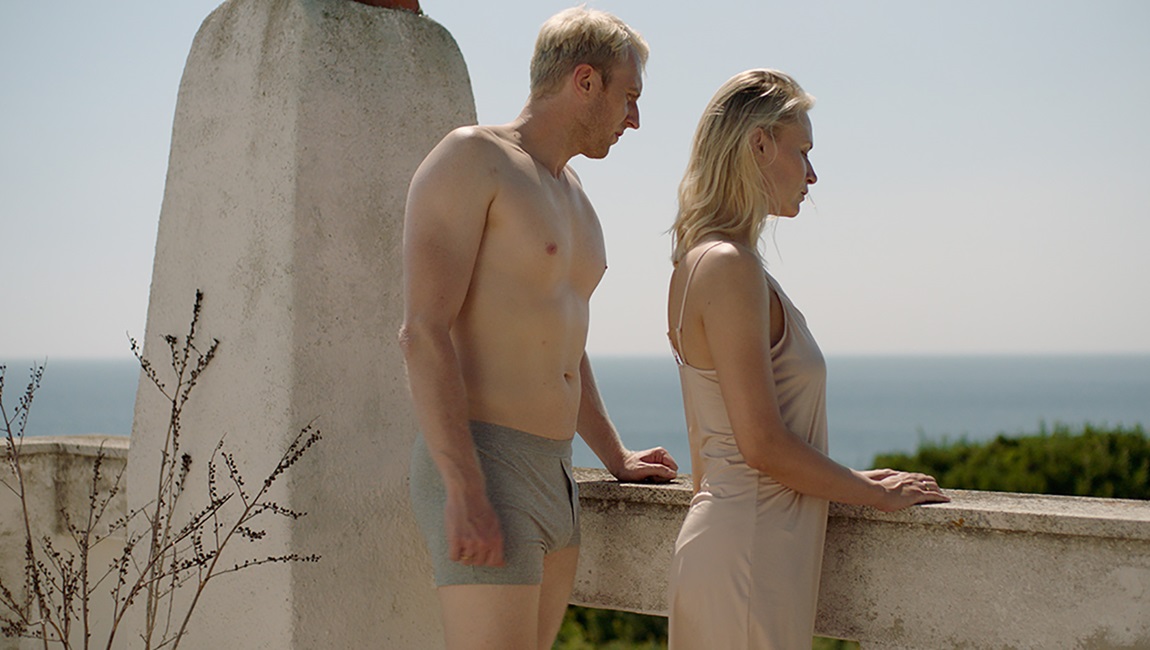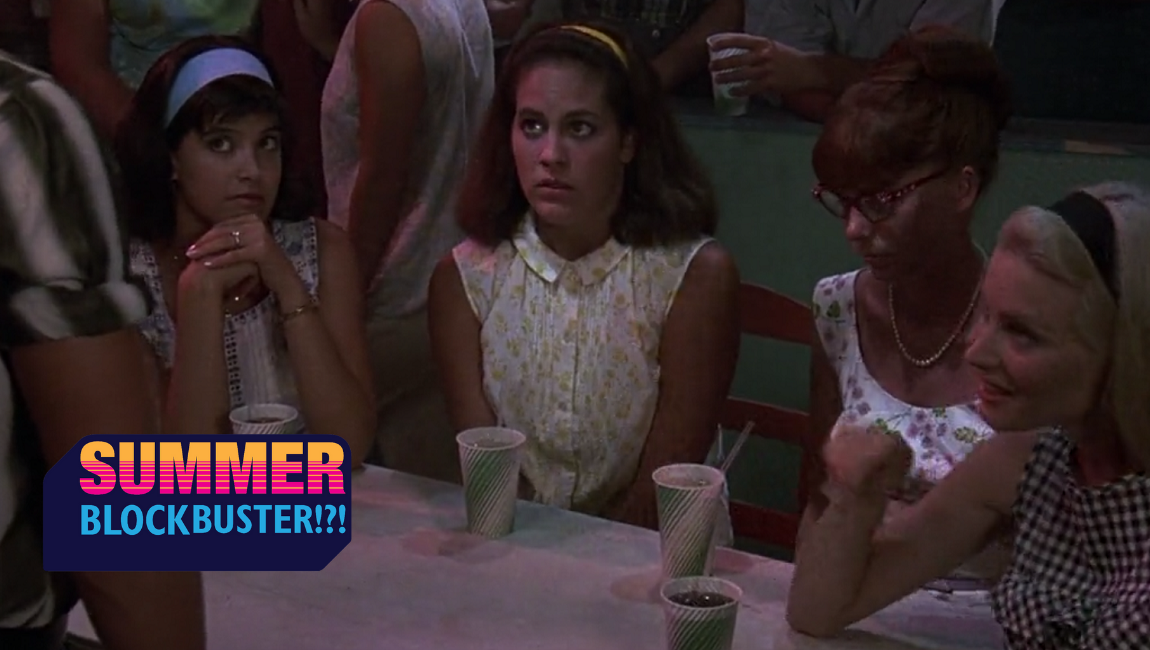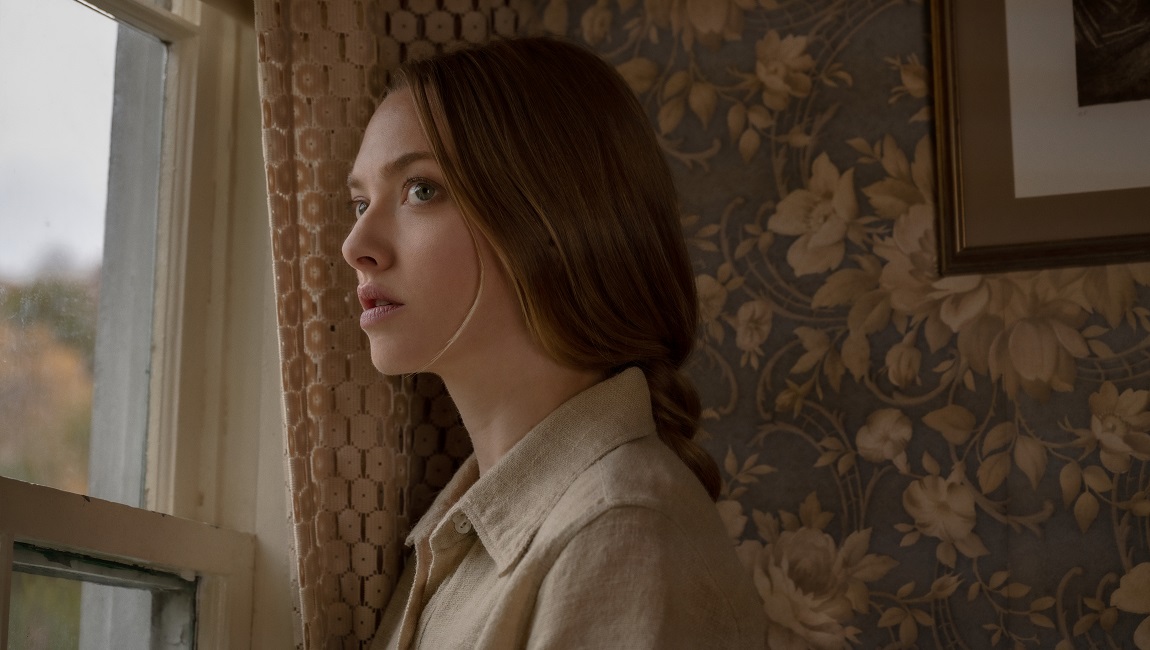“The island is safe, except for those who aren’t invited.” This quote from one of the natives on the Italian island where a rich and attractive Polish couple vacations just might reflect the key idea of Aga Woszczyńska’s feature directorial debut Silent Land. With a premise somewhat similar to Michael Haneke’s Funny Games, an unexpected violent incident and the chain of reaction following the inciting event interrupts a peaceable European holiday. But unlike Haneke’s masterpiece, Silent Land bores by reveling too much in its own insincere cleverness, even if Woszczyńska and her filmmaking team show promise as visual thinkers.
Married couple Anna (Agnieszka Żulewska) and Adam (Dobromir Dymecki) don’t know how to have fun. Their idea of a good vacation is sitting in a backyard pool all day and never interacting with others. They are too bourgeois for anything like sightseeing, which sets their work break up for failure when there is no water at the pool on the property they rented. The property owner sends an undocumented Arab worker named Rahim (Ibrahim Keshk) to fix things up. He’s attractive and doesn’t always wear a shirt while he’s working on the pool, and that captures the attention of Anna. She looks at him a bit longer than she’s supposed to, though her gaze hovers unsettlingly somewhere between lustful and racist. Of course, those two aren’t exclusive, and in Anna’s case, perhaps they are even related in some sort of sexual exoticization of the Arab other (the power dynamics, too, can’t be ignored). Regardless, her way of looking pushes well past comfortability.
It’s Anna’s that gaze sets up the film’s “big” moment. As the hot pool (repair) boy breaks a sweat servicing rich people problems, he slips, hits his head, and drowns in the water. (Water that wouldn’t have been there without Rahim’s manual labor in the first place.) Anna and Adam, having a coffee on the balcony, hear something, pivot their attention to the pool down below, and call Fabio (Marcello Romolo), the landlord. They could hardly do less: they do not check on the body for a pulse, perform CPR, or even call the emergency responders themselves. (Their excuse is that they do not speak Italian, though they speak perfectly handy English.) CCTV captures their inaction and reveals their web of lies, but the police don’t care anyway — Rahim is an undocumented Arab boy, after all. The verticality of the scene, with the reach of the high-up balcony situated above the undocumented migrant so far below that he’s literally underneath the frame, is one of Woszczyńska’s most savvily effective choices.
But while this element of social storytelling should be the film’s most interesting element at play, in execution it’s closer to the worst. The event comes so quickly that it disrupts the world before disruption would be impactful, and Anna and Adam have so little character to them that the reactive position they find themselves in proves baneful. Knowing more about the couple and their lives back home would encourage a closer viewing of the dissonances of power and privilege, but Woszczyńska, unfortunately, does nothing more with the setup than her two main characters do when witnessing death. They are so boring that the film’s greatest asset lies in their leisurely languor. Every conversation they have goes no deeper than a conversation with Open AI would, and they even introduce themselves to the camera with a discussion about the furniture at home. Their idea of a holiday is about as exciting as watching middle school lacrosse on a 100° day. The only thing worthwhile these two seem to do is fuck each other, but they can’t even have fun while doing that. They have sex three times throughout the film, and cinematographer Bartosz Świniarski keeps the lights real low, flattening any potential for evocative scene choreography and matching the energy of the intercourse: lifeless. Anna twice fucks Adam with her back turned to him as if she doesn’t want to look at him, and given the notably low visibility, it’s enough to wonder if the filmmakers are suggesting that maybe we don’t want to look at them either because of how banal this sex is.
Woszczyńska does show a knack for blocking, and Silent Land‘s best scene depends on her ability to intelligently block her actors. From a distanced two shot, the couple bitches and fights with each other. She says something he doesn’t like, and he responds by getting off the bed and towering over her, pushing her out of the camera’s obstructed viewpoint; as Adam gets aggressive, we see him but not her. All attention resets to him and his intimidating actions rather than her reactions to his aggression. Here, Woszczyńska (and Świniarski) bring critical attention to the masculine abuse of power while removing from interpretation or discussion from female blame or even empathy. It’s just too bad this kind of care is mostly missing throughout the rest of Silent Land.
DIRECTOR: Aga Woszczyńska; CAST: Dobromir Dybecki, Agnieszka Zulewska, Alma Jodorowsky; DISTRIBUTOR: Film Movement; STREAMING: May 31; RUNTIME: 1 hr. 53 min.







